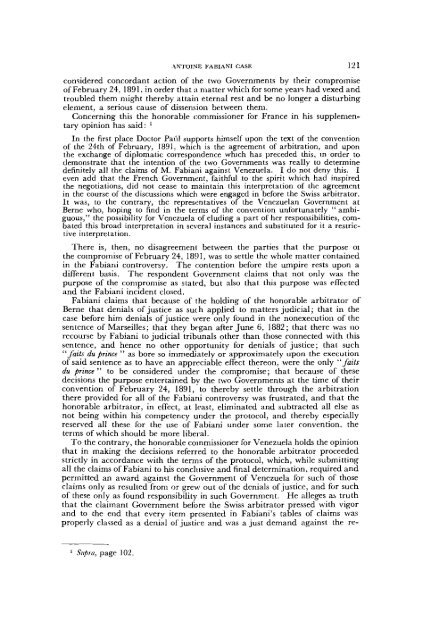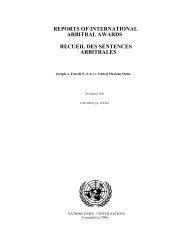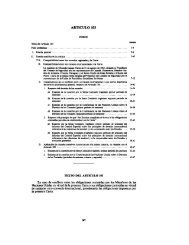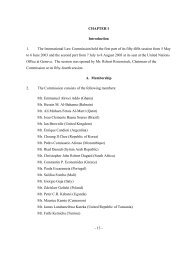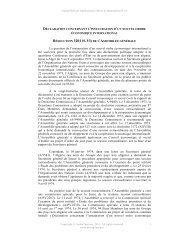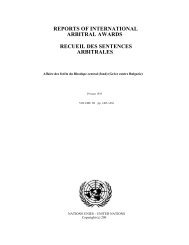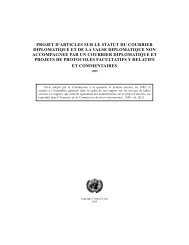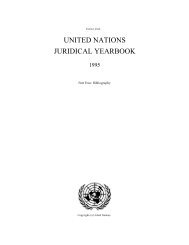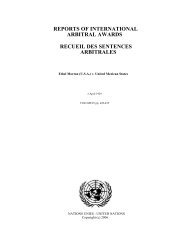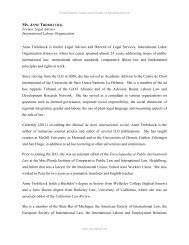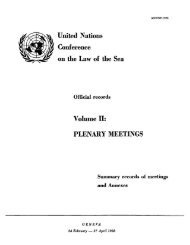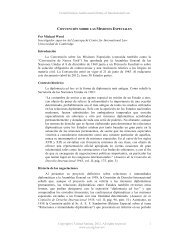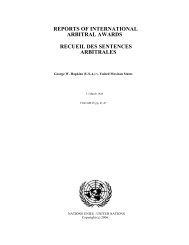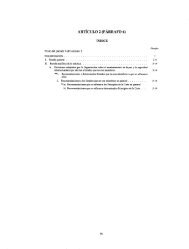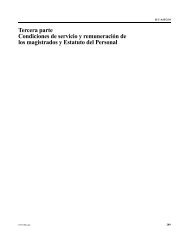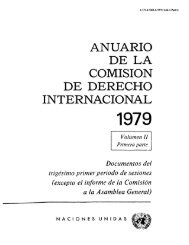Antoine Fabiani Case - United Nations Treaty Collection
Antoine Fabiani Case - United Nations Treaty Collection
Antoine Fabiani Case - United Nations Treaty Collection
Create successful ePaper yourself
Turn your PDF publications into a flip-book with our unique Google optimized e-Paper software.
ANTOINE FABIANI CASE 121<br />
considered concordant action of the two Governments by their compromise<br />
of February 24, 1891, in order that a matter which for some years had vexed and<br />
troubled them might thereby attain eternal rest and be no longer a disturbing<br />
element, a serious cause of dissension between them.<br />
Concerning this the honorable commissioner for France in his supplementary<br />
opinion has said: 1<br />
In the first place Doctor Paul supports himself upon the text of the convention<br />
of the 24th of February, 1891, which is the agreement of arbitration, and upon<br />
the exchange of diplomatic correspondence which has preceded this, in order to<br />
demonstrate that the intention of the two Governments was really to determine<br />
definitely all the claims of M. <strong>Fabiani</strong> against Venezuela. I do not deny this. I<br />
even add that the French Government, faithful to the spirit which had inspired<br />
the negotiations, did not cease to maintain this interpretation of the agreement<br />
in the course of the discussions which were engaged in before the Swiss arbitrator.<br />
It was, to the contrary, the representatives of the Venezuelan Government at<br />
Berne who, hoping to find in the terms of the convention unfortunately " ambiguous,"<br />
the possibility for Venezuela of eluding a part of her responsibilities, combated<br />
this broad interpretation in several instances and substituted for it a restrictive<br />
interpretation.<br />
There is, then, no disagreement between the parties that the purpose oi<br />
the compromise of February 24, 1891, was to settle the whole matter contained<br />
in the <strong>Fabiani</strong> controversy. The contention before the umpire rests upon a<br />
different basis. The respondent Government claims that not only was the<br />
purpose of the compromise as stated, but also that this purpose was effected<br />
and the <strong>Fabiani</strong> incident closed.<br />
<strong>Fabiani</strong> claims that because of the holding of the honorable arbitrator of<br />
Berne that denials of justice as such applied to matters judicial; that in the<br />
case before him denials of justice were only found in the nonexecution of the<br />
sentence of Marseilles ; that they began after June 6, 1882; that there was no<br />
recourse by <strong>Fabiani</strong> to judicial tribunals other than those connected with this<br />
sentence, and hence no other opportunity for denials of justice; that such<br />
"Jaits du prince " as bore so immediately or approximately upon the execution<br />
of said sentence as to have an appreciable effect thereon, were the only "faits<br />
du prince " to be considered under the compromise; that because of these<br />
decisions the purpose entertained by the two Governments at the time of their<br />
convention of February 24, 1891, to thereby settle through the arbitration<br />
there provided for all of the <strong>Fabiani</strong> controversy was frustrated, and that the<br />
honorable arbitrator, in effect, at least, eliminated and subtracted all else as<br />
not being within his competency under the protocol, and thereby especially<br />
reserved all these for the use of <strong>Fabiani</strong> under some later convention, the<br />
terms of which should be more liberal.<br />
To the contrary, the honorable commissioner for Venezuela holds the opinion<br />
that in making the decisions referred to the honorable arbitrator proceeded<br />
strictly in accordance with the terms of the protocol, which, while submitting<br />
all the claims of <strong>Fabiani</strong> to his conclusive and final determination, required and<br />
permitted an award against the Government of Venezuela for such of those<br />
claims only as resulted from or grew out of the denials of justice, and for such<br />
of these only as found responsibility in such Government. He alleges as truth<br />
that the claimant Government before the Swiss arbitrator pressed with vigor<br />
and to the end that every item presented in <strong>Fabiani</strong>'s tables of claims was<br />
properly classed as a denial of justice and was a just demand against the re-<br />
Sufira, page 102.


